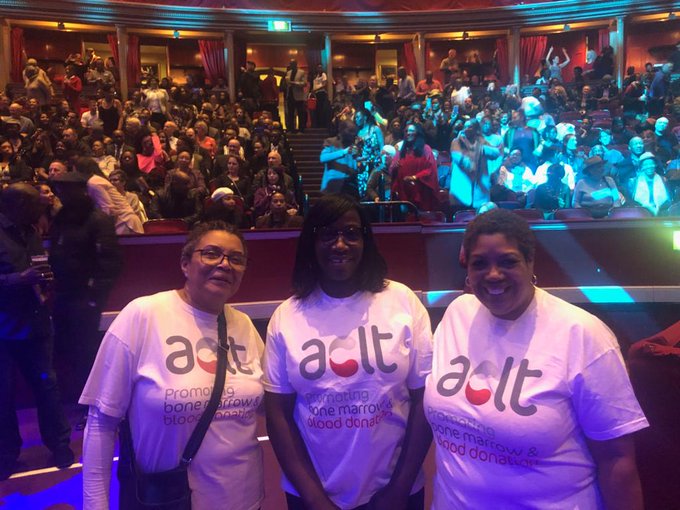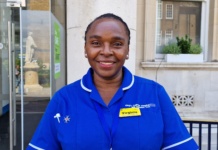


Four organisations working within the black community joined the campaign to address the urgent need for black, Asian and minority ethnic organ donors.
The projects were amongst 25 organisations to share a £140,000 Community Investment Scheme funding pot to encourage more people from these backgrounds to become lifesaving organ donors.
The organisations who delivered projects are the African Caribbean Leukaemia Trust (ACLT), One World Foundation, Caribbean & African Health Network Greater Manchester, and the Royal Free London NHS Foundation Trust’s Kidney Patients Association.
The faith and community based organisations designed and implemented projects to break down myths and increase support for organ donation after securing funding in October 2018 through NHS Blood and Transplant’s BAME Community Investment Scheme.
Now the impact of the project delivered by all four organisations has been published in a progress report into the first round of projects funded through the scheme. The London-focused project from One World Foundation, ‘Save a Life’, aimed to address the myths and barriers that people from the Swahili speaking community face when discussing organ donation. It also included hosting events, outreach activities and creating posters and leaflets.
The project by Royal Free London NHS Foundation Trust’s Kidney Patients Association, in collaboration with Joined Up Thinking JUT CIC and Creative Youth Zone, focussed on the London borough of Haringey. It encouraged young adults from the black African and Caribbean community to become ambassadors for organ donation.
The ‘Precious Life Savers’ project by Caribbean & African Health Network (CAHN) in Greater Manchester aimed to engage black faith leaders and their congregations.
The African Caribbean Leukaemia Trust (ACLT) project aimed to challenge attitudes towards organ donation among London’s black community by hosting presentations at schools and community events, and through social media.
Orin Lewis of ACLT said: “The Community Investment Scheme has been a great opportunity to raise awareness of organ donation in the African and Caribbean community.
“For our community, the twin issues of mistrust of the medical establishments and misinterpretation of religious beliefs can be a real barrier to considering the subject of deceased organ donation. In order to start breaking down these barriers during the lifetime of the project we engaged the community by delivering numerous direct presentation talks and discussions.
“In total we engaged with over 15,000 people, at 15 events, workshops and forums and have encouraged nearly 300 people to become organ donors.
“The Community Investment Scheme has created the opportunity of supporting and enhancing the successful strategies that have emanated from this project to enable more future constructive discussion and debate leading to more sign ups to give the gift of life.”
The BAME Community Investment Scheme is an important part of a Government campaign led by NHS Blood and Transplant, with support from the National BAME Transplant Alliance (NBTA), to address the critical shortage of organ donors from these backgrounds.
Health Minister Lord Bethell said: “Organ transplants are one of the great success stories of modern medicine, saving millions of lives around the world. But what happens to your body when you die is very personal, and something that can be difficult to talk about.
“Building awareness is critical, and projects like this are doing excellent work with local communities and black and minority ethnic groups. This is especially vital as people from BAME backgrounds are more likely to need a transplant, but tragically less likely to receive one due to the shortage of BAME donors to provide the right match. To save more lives, we need to make sure these conversations happen.”
The evaluation of the 25 projects in England and Wales funded under the first round of the BAME Community Investment Scheme* has now been published: www.nhsbt.nhs.uk/cisreport
The projects were delivered by organisations representing Jain, Sikh, Hindu, Muslim, Swahili, black and Asian Christians, black African and Caribbean and multi-faith groups.
In total more than 200 community events were delivered while 130,000 people attended organ donation events. Around 4,000 people engaged in conversation or took away a leaflet or information and 8,000 attended a talk or workshop.
Millie Banerjee, Chairman of NHS Blood and Transplant, said: “Because the BAME Community Investment Scheme aims to drive a conversation about organ donation, its impact can’t be measured in numbers alone.
“However, it is clear these innovative projects reached and engaged many people across a broad spectrum of faiths and communities and played an important role in communicating the facts about organ donation.
“We hope that hearing a positive organ donation message from a trusted voice has helped encourage more people in black, Asian, mixed race and minority ethnic communities to decide they want to be a lifesaving donor, and share that decision with their families. I would like to thank each of the organisations for their dedication to saving lives.”
From 20 May 2020 all adults in England are now considered as having agreed to donate their own organs when they die, unless they record a decision not to donate (known as ‘opt out’), are in one of the excluded groups** or have nominated a representative to make the decision on their behalf.
Even though organ donation law in England has changed, people still have a choice whether they want to donate, families will still be approached before organ donation goes ahead, and a person’s faith, beliefs and culture will continue to be respected before, during and after the organ donation process.
To find out more or to register your organ donation decision, visit: www.organdonation.nhs.uk

Kindly follow us on twitter:@AfricanVoice2










